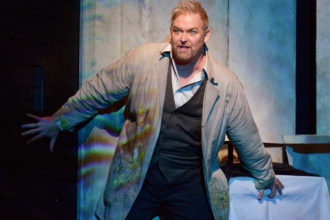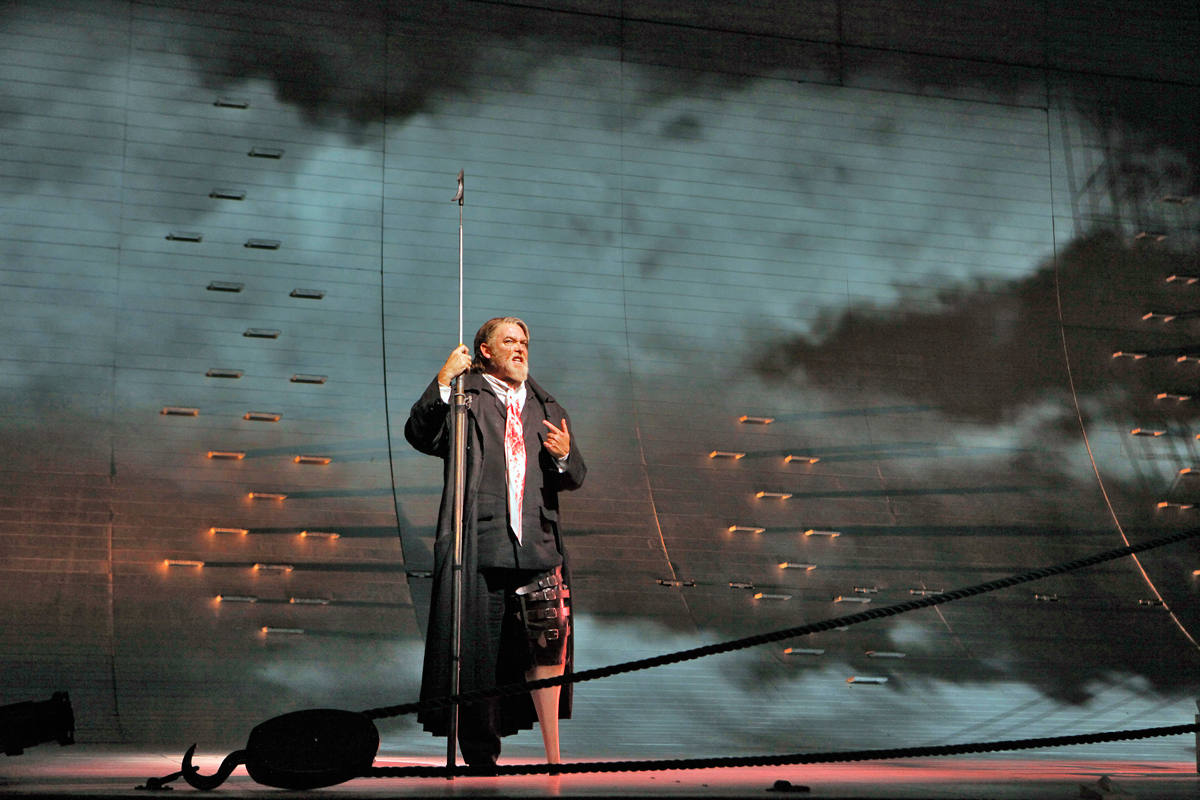When the Dallas Opera debuted Jake Heggie’s Moby-Dick, in 2010, there was no question as to who had to pioneer the role of the central character, Ahab. Heggie had written a tremendously difficult role to sing. The singer would need to be a heldentenor, a voice characterized by its broad range and dramatic weight that is most associated with the Wagnerian repertoire. The singer would also need to possess a powerful stage presence. The success of Heggie’s opera rests on the ability of Ahab to carry the emotional arc of the piece. And, making things even more difficult, the singer would have to possess the physical stamina to spend the entire opera with his body strapped to a peg leg.
So, in 2010, there was no doubt that Ben Heppner had to sing Ahab. Considered one of the finest heldentenors in the world, Heppner injected the Dallas premiere of Moby-Dick with a gravitas and flair that helped to launch the new opera’s surprisingly resilient stage life. Since that premiere, Moby-Dick has gone on to be performed by seven opera companies in just six years. Reviews of the work have been mixed, but audiences go nuts for the whale. This month, the Dallas Opera brings Moby-Dick back to Dallas—a programming move that feels less like a revival and more like a leg on a victory tour. That success has everything to do with how the character of Ahab continues to resonate.
Since that first run in Dallas, however, Heppner has retired, and the role of Ahab has become more closely associated with another singer, a relatively young, up-and-coming heldentenor named Jay Hunter Morris. He took over for Heppner in the second staging of Moby-Dick at the State Opera of South Australia and has followed the role to San Diego and San Francisco.
At the time of Moby-Dick’s debut, Morris was nowhere near the name in opera that Heppner was. Then, in 2012, Morris became one of the most talked-about new heldentenors in the world, after he stepped off the bench as an understudy to sing the title role of Siegfried in the Metropolitan Opera’s 2012 production of Wagner’s Ring Cycle. What Morris did was unheard of: singing one of the most difficult roles in the repertoire on one of the world’s most important opera stages with just a few days’ notice. But what made the story sweeter was that this charismatic, sprightly singer—with his broad, heroic shoulders and bright, naif grin—seemed to come from nowhere.
But Morris hadn’t emerged from nowhere. He came from Paris, Texas.

Morris in the Dallas Opera’s 2014 production of Die tote Stadt. His first musical hero was Larry Gatlin.
The closest thing they have to opera in Paris is Sunday service. Morris was born in the East Texas town in 1963, and he grew up in the Southern Baptist church. His father was a music minister; his mom played the church organ. Morris sang in the choir, performed in high school musicals, and played happy-hour gigs at the local Holiday Inn with garage rock bands. For a kid from Paris, high culture meant traveling with his church youth group to Six Flags Over Texas. When he was 14, Morris saw Larry Gatlin and the Gatlin Brothers perform at Six Flags. It was the first full-fledged professional musical performance he had ever seen, and Morris was hooked.
“I knew that night I wanted to be Larry Gatlin,” he says.
Morris dreamed of a life in music, but his ambition wasn’t exactly matched by recognition of his vocal talent. As a young singer, he wasn’t a standout. In high school, he tried out for all-state choir, but the closest he ever got was all-region. He studied music at Baylor and moved to Nashville after graduating. But dreams of country or gospel music aside, if you asked Jay Hunter Morris in his early 20s where he thought music could take him, he would probably say back to Paris, singing at church.
In opera, lives are often transformed in singular, dramatic moments. Morris’ life seems to be filled with such twists of fate. At 25, he attended a performance of La Traviata at the Dallas Opera and was so moved by the experience that he enrolled at SMU to study voice. At SMU, he was mentored by the acclaimed tenor Thomas Hayward, who recognized previously overlooked talent in Morris and arranged for a job in the Dallas Opera chorus. When Morris finished at SMU, he had no idea how to pursue a career in opera. He missed all of the application deadlines for apprentice programs, but former Dallas Opera artistic director Jonathan Pell managed to convince his friend John Crosby, founder of the Santa Fe Opera, to accept Morris into the company’s young artists program. That eventually led to an invitation to study at Juilliard and supporting roles in operas. A big break came when he was cast in the Tony Award-winning production of Terrence McNally’s play Master Class.
By the late 1990s, Morris had a career, but his voice was beginning to waver. He was singing lyric tenor roles. He was cast in a production of Lucia di Lammermoor at the Dallas Opera, but he was singing so poorly he thought he was going to be fired. Then Morris experienced another life-changing, operatic intervention. Backstage during a rehearsal, one of Morris’ Lucia co-stars, Grammy-winning tenor Jerry Hadley, gave Morris a 15-minute vocal lesson. Hadley taught him how to broaden his range, how to dig deeper, open up his throat, mine something more expansive and weighty from his register.
“That changed my life,” he says. “I got my first glimpse of being able to sing like a big boy.”
Heldentenors are a rare breed. There are only a handful of singers in the world who can sing the whole repertoire. Die-hard Wagner aficionados enjoy complaining about the lack of true heldentenors and pine for lost talents of yesteryear. The roles—like Wagner’s Tristan or Verdi’s Otello—are not only difficult to sing, they require learning massive amounts of music and exhibiting superhuman stamina. Morris studied the role of Siegfried for four years before he sang the role at the Met and entered an elite fraternity of operatic singer-gods.
While Wagner may have made Morris’ name, it is the role of Ahab that has defined his place in the repertoire. Morris brings to Ahab a charisma and stage presence that are rare in opera singers. He says he loves the role because it feels so removed from who he really is: the gentle, kindly, disarmingly sincere opera singer with the thick East Texas accent (he titled his 2013 autobiography Diary of a Redneck Opera Zinger) embodying one of the titans of literature, a ferocious, maniacal captain who leads his crew to their deaths. It’s quite a transformation.
But still, when you hear Morris talk about the role—and when you consider the long, arduous, and circuitous journey he has endured on his voyage from Paris, Texas, to the world’s top opera stages—you can’t help but think that there is more than a little Ahab in Jay Hunter Morris.
“He is so obsessed, so single-minded,” Morris says. “But he also must possess a power or a charisma that very few people in history have managed to muster. I love playing the guy.”






